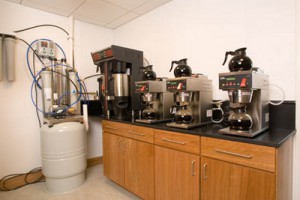Brewing Coffee – Testing and Analysis
Any coffee, no matter of what quality, can be affected dramatically at the stage of brewing. Brewing is a chemical reaction between hot water and coffee. According to work done by the Coffee Brewing Center, while roasted ground coffee is about 30% soluble by weight, only 18-22% of that soluble material results in desirable coffee flavor. This material must be present in a certain concentration to be best appreciated. For more details on ideal conditions for producing a satisfying cup, see the SCAA website.
Important Considerations
Most parameters affecting brewed coffee are those which must be adjusted (and measured) on site. Sensory evaluation must be performed when the coffee is freshly brewed to be evaluated fairly.
However, some clues as to the quality of brewed product can be obtained through certain measurements.
Perhaps the most important (and often ignored) factor in brewing is water quality. Water makes up 98-99% of the finished beverage and any off-flavors will ruin a cup of coffee. The presence or absence of certain chemicals will inhibit or allow the best flavor to emerge.
Water Quality
As brewed coffee is 98-99% water, the quality of that ingredient dramatically affects the finished product.
Two parameters are important in measuring brewed coffee: the quality of flavor and the strength of flavor. The strength of flavor, the amount of solids that have actually been extracted, can be measured by the use of a Total Dissolved Solids (TDS) meter. This information can be extrapolated to determine the flavor quality if the water to coffee ratio is known. Testing of pH can give additional clues as to the quality of the brew.
It is especially important for retailers of brewed coffee with multiple locations to produce coffee beverages that are consistent at all locations. One can use these tests to determine how closely the different locations match up, and then create a coffee specification program to ensure consistent quality.


